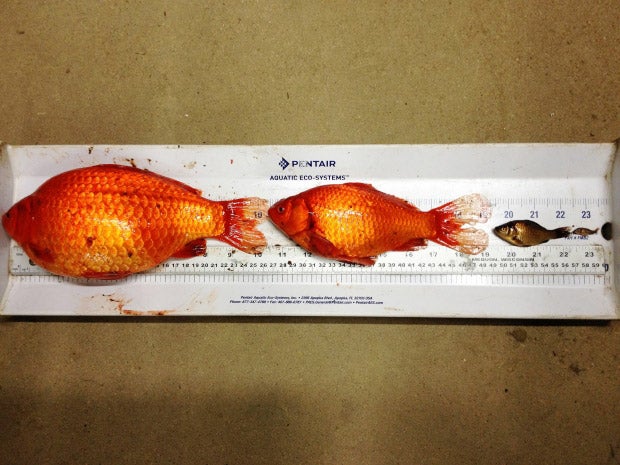Government takes action against the giant goldfish clogging up Canada's lakes and rivers
Goldfish released from domestic fish tanks are growing to gargantuan sizes, and causing problems for Alberta's fragile ecosystem

Giant goldfish released from domestic fish tanks are multiplying like rabbits in the ponds and lakes of Alberta, Canada, and the local government has been forced to take steps to prevent them spreading further.
Some of the rogue fish are growing to the size of dinner plates, and they're causing huge problems for the delicate native ecosystem.
The problem stems from people releasing their pet goldfish into Alberta's streams and lakes once they get sick of taking care of them.
Once in the wild, the fish can survive Alberta's harsh winters and grow to huge sizes. Since they have no natural predators in the province, they can out-compete native fish species for food and other resources and reduce biodiversity in the area.
Kate Wilson, aquatic invasive species coordinator at Alberta Environment and Parks, told CBC Calgary she was surprised at how large some of the fish are, and at the sheer numbers they are finding.

In one case, environmental workers pulled 40 goldfish from a single pond.
Invasive species can be a problem in every environment and can simply be introduced to a new ecosystem by accident. However, Wilson said that around a third of these troublesome fish come from aquariums and the ornamental trade.
Alberta's new Don't Let it Loose campaign will focus on educating the public about the impact of these invasive species, and will target pet shops and aquarium businesses.
Even religious groups will be reached out to by the campaign, particularly Buddhist groups, who often organise 'mercy releases': the practice of buying thousands of fish from pet shops and releasing them into the wild, in an intended act of compassion.
However, once in the wild, many of these animals die fairly quickly. The ones that survive can cause huge suffering to other animals in the ecosystem, who cannot adapt to the sudden influx of the non-native species.
With the maximum fine for releasing live fish into Alberta's lakes and rivers being $100,000 (£51,000), the Environment and Parks department recommends that people who don't want their pet fish any more either try to return it, give it to another aquarium owner, donate it to a local school, or talk to a vet about humane disposal.
While wild goldfish can cause big problems for Alberta's marine life, another invasive species is causing millions of dollars worth of damage for the local authorities.
Non-native organisms like the Zebra and Quagga mussels were believed to have first arrived in Canada in the 1980s. Native to the Black Sea, it is thought their larvae were brought over in the ballast water of large ships.
They have multiplied rapidly, and have caused problems by growing inside water pipes, dam intakes, and other bits of underwater infastructure. It is thought the disruption and repair costs they create amount to more than $75 million (£39 million) a year in Alberta alone.
Join our commenting forum
Join thought-provoking conversations, follow other Independent readers and see their replies
Comments
Bookmark popover
Removed from bookmarks